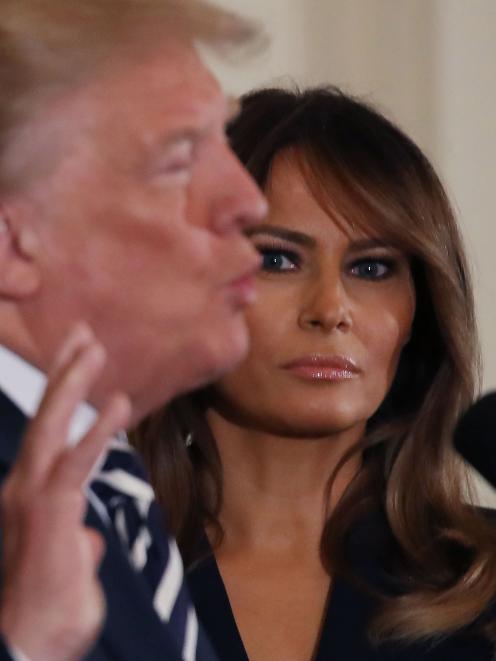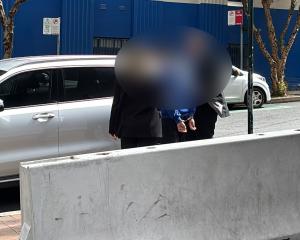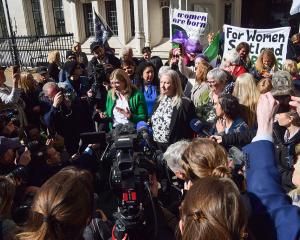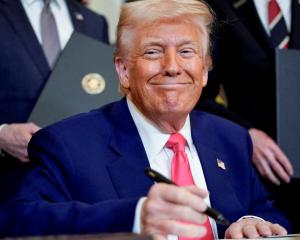President Donald Trump has backed down and abandoned his policy of separating immigrant children from their families on the U.S.-Mexico border, after images of youngsters in cages sparked outrage at home and abroad.
Trump signed an executive order on Wednesday (local time) requiring that immigrant families be detained together when they are caught entering the country illegally for as long as their criminal proceedings take. That may violate a court settlement on how long children may be held, setting up a potential legal fight, unless Congress acts on the issue.
The Trump order, an unusual reversal by him, also moves parents with children to the front of the line for immigration proceedings. The order does not end a 10-week-old "zero tolerance" policy that calls for criminal prosecution of immigrants crossing the border illegally.

“It's about keeping families together while at the same time making sure that we have a very powerful, very strong border,” Trump said as he signed the order in a hastily arranged Oval Office gathering minutes before departing for a campaign event.
The videos of children sitting in cages and an audiotape of wailing children had sparked anger in the United States from groups ranging from clergy to influential business leaders, as well as condemnation from abroad, including by Pope Francis.
Trump, an avid viewer of cable television news, recognised that the family separation issue was a growing political problem, White House sources said.
First Lady Melania Trump, in private conversations with the president, urged him to do something, a White House official said. In the Oval Office, Trump said he had heard from his daughter Ivanka about the policy, too.
"Ivanka feels very strongly. My wife feels very strongly about it. I feel very strongly about it. I think anybody with a heart would feel very strongly about it," Trump said.
Wednesday's move was the most significant policy reversal by Trump since he took office in January 2017. Instinctively combative and fond of chaos, Trump usually digs in on controversial policies, rather than backing down.
But the volume of condemnation on breaking up families, from inside and outside the White House, finally overwhelmed Trump.

NEW HEADACHES
The reversal also creates a series of new headaches for the administration, as it wrestles with where to house families that are detained together, possibly for long periods, and how to reunite families that already have been separated.
"This executive order would replace one crisis for another. Children don’t belong in jail at all, even with their parents, under any set of circumstances. If the president thinks placing families in jail indefinitely is what people have been asking for, he is grossly mistaken,” said Anthony Romero, executive director of the American Civil Liberties Union.
Parents referred by border agents for prosecution are held in federal jails, while their children have remained in US Customs and Border Protection custody or have been moved into detention facilities managed by the Office of Refugee Resettlement, a Department of Health and Human Services agency.
US Customs and Border Protection said on Tuesday that 2342 children had been separated from their parents at the border between May 5 and June 9.
The order directs the US Justice Department to seek a modification of a court order to permit families that enter the United States illegally to be detained together until their criminal proceedings are concluded, a text of the order shows.
It also directs the Department of Defence to take steps to house detained immigrant families as needed.
Trump has made a tough stance on immigration central to his presidency. In recent days, he had insisted his hands were tied by law on the issue of family separations and blamed Democrats for the problem, even though his administration implemented the policy of strict adherence to immigration law.
BILLS IN CONGRESS
The Republican-controlled US Congress is also considering legislation to address the issue. The House of Representatives planned to vote on Thursday on two bills designed to halt family separations and address a range of other immigration issues.
"We are working on a much more comprehensive bill," Trump said.
Republicans said they were uncertain if either House measure would have enough votes to pass. Trump told House Republicans on Tuesday night he would support either of the bills.
Both House bills, which Democrats and immigration advocacy groups have blasted, would fund Trump's proposed wall on the US-Mexico border, as well as reduce legal migration, in part by denying visas for some relatives of US residents and citizens living abroad, sometimes called "chain migration."
The more conservative bill from Republican Representative Bob Goodlatte also would deny the chance of future citizenship to "Dreamers," who are immigrants brought illegally into the United States years ago as children.
NOT ALL FAMILIES MAY BE SAFE
However, several Republican members of the House of Representatives briefed by Homeland Security Secretary Kirstjen Nielsen about Trump's executive order say they they do not know if it will prevent family separations during detentions longer than 20 days.
Nielsen explained the order Trump had signed an hour earlier to keep immigrant families together as they await immigration proceedings. But it appeared that the time parents can stay with their children is capped at 20 days.
"Basically you can only hold people for 20 days so it keeps the families together for at least that period of time while we hopefully get a legislative fix," said Representative Mark Meadows, chair of the conservative House Freedom Caucus, after the briefing.
Under a court settlement, the federal government cannot hold the children for more than 20 days. In the past, the government released entire families once the clock ran out.
Now, with the number of families detained rising during Trump's current immigration crackdown, questions were immediately raised about whether children will be released into foster or other care at the end of 20 days if their parents' immigration proceedings have not wrapped up.












